2007-06-30 La Boheme (Puccini), Arena di Verona
Rodolfo = Marcello Giordani
Mimì = Tamar Iveri
Marcello = Gabriele Viviani
Musetta = Donata D'Annunzio Lombardi
Colline = Marco Spotti
Alcindoro = Angelo Nardinocchi
Schaunard = Fabio Previati
Benoit = Graziano Polidori
Parpignol = Carlo Bosi
A customs official = Federico Longhi
Lü Jia, conductor
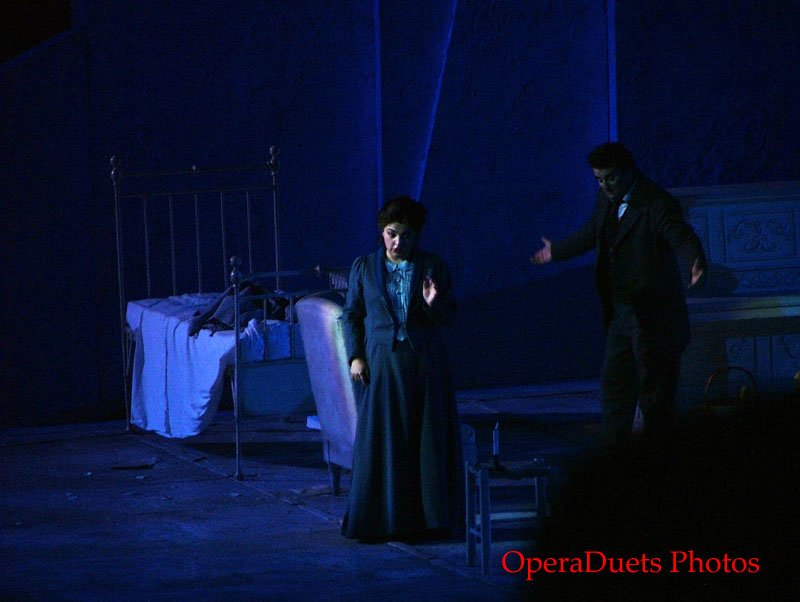
La Bohème
Opera in 4 acts by
Giacomo Puccini
Libretto by Giuseppe Giacosa e Luigi Illica
opera and synopsis
Arena
30 June 2007 at 21.15
Season Tickets
Principal Conductor Lü Jia
Director Arnaud Bernard
Scenographer William Orlandi
Costume Designer William Orlandi
Choir Master Marco Faelli
Lighting Designer Paolo Mazzon
Director of stage design Giuseppe De Filippi Venezia
Orchestra, Chorus and technicians
from the Arena di Verona
Another fine day in Verona, Italy. Problem with Arena di Verona and La Boheme, is that the stage is huge, and that this opera is more of a intimate romance. Of course act 2 is a great, big scene with lots of people. But this problem was a Zeffirelli-like production, huge and the little people got lost. Not being able to find out right a way Rodolfo and Mimi was a disappointment. Zeffirelli would not have made that fault, I believe. he would have a way to highlight the important people in the opera. Act 1 + 4, all action in a tiny bit of the stage, in the middle. But the Arena is so big why did the director not make the attic of the artists, Marcello and Rodolfo, huge using most of the arena stage area.
Other problems was for me all the circus of act2, people blowing fires from their mouth. Just a show that made it difficult to get the real operatic action... And act 3, very bad, hated the bicycles thing. Here we are supposed to see peasant woman at the customs controlling their bread, milk cans etc. The bicycling was just a circus thing... And act 4, when the guys are pretending to be at a ball. Here they were not dancing, they were drying up laundry and playing with that, Gavotta, Pavanella, Fandango... no dance.
The singers, orchestra was all great and the production was not all bad, just not quite right and Arena was not the right place.
OD Travel + Photos
Original blog post
Friday, June 30, 2017
June 30, 2007: La Boheme in Verona
Posted by
operaduets
at
Friday, June 30, 2017
0
comments
![]()
Labels: 06_June, 2007, BOHEME, Gabriele Viviani, GIACOMO PUCCINI, Italy, Marcello Giordani, Opera, Tamar Iveri, Verona
June 30, 2003: Carmen in Vienna
2003-06-30 Carmen (G. Bizet), Wiener Staatsoper
Carmen = Agnes Baltsa
Don José = Julian Gavin
Escamillo = Ildar Abdrazakov
Micaëla = Roxana Briban
Frasquita = Simina Ivan
Mercédès = Cornelia Salje
Zuniga = Goran Simic
Moralès = Yu Chen
Remendado = Walter Pauritsch
Dancaïro = Hans Peter Kammerer
Lillas Pastia = Csaba Markovits
Vjekoslav Sutej, conductor
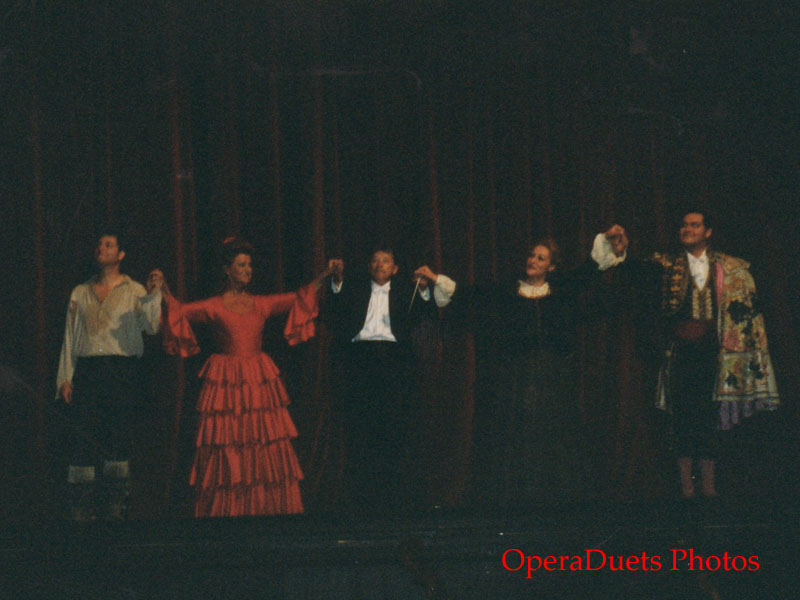
Wlener Staatsoper
Montag, 30. juni 2003
114. Aufführung in dieser Inszenierung
Carmen
Oper in vier Akten von Henri Meilhac und Ludovic Halévy nach einer Novelle von Prosper Mérimée
Musik von Georges Bizet
Dirigent Vjekoslav Sutej
Inszenierung und
Bühnenbild Franco Zeffirelli
KostümeLeo Bei
Choreographie Rafael de Cordova
Chorleitung Ernst Dunshirn
Tänze Patricia Sollak
Rudolf Wächter
Christoph Wenzel
und das Corps de ballet
.
Micaëla Roxana Briban Debüt an der Wiener Staatsoper
Carmen in Wiener Staatsoper 30.6.2003 again with Julian Gavin and Agnes Baltsa. New Micaela = Roxana Briban (first time in Vienna State Opera). A really another Carmen, of course it is still the same Zeffirelli production, but a lot of small and not so small changes in the interpretation. A much better performance, but a cooler audience I think, but totally extatic in the end. This Micaela is really a young girl from the country 16/17 year old as the libretto states, or at least in the full dialogue
version, but this is still a minimal dialogue version most of the opera. She is very young and innocent, wonderful voice and acting of Roxana Briban. I have found out what is wrong with Julian Gavin and his singing, I think it is the dynamics, his voice often looses his strength, his French pronunciation is a bit better today. Agnes
Baltsa is the most fiery Carmen. This time she do get an applause after the 3 act aria, even though she is awfully quick in saying "eh bien" after the aria, usually we have no time to applaud the opera just go on quickly. I wish I really could describe this Carmen, especially all the the changes in not only interpretation, where
Carmen is on stage, but also some changes in the dialogue. And it is the last opera performance in Wiener Staatsoper for the season 2002/2003. I got the new program in my hands. And is a wonderful end of the season, and also the last opera in this travel.
I waited too long at the stage door thinking Agnes Baltsa would appear. And then I walked quickly the Kärtnerstrasse up to U-Bahn Stephanplatz and took U-Bahn to Westbahnhof, my luggage out of the locker, and was just in time to see the train leave the station building.
OD Travel + Photos
Posted by
operaduets
at
Friday, June 30, 2017
0
comments
![]()
Labels: 06_June, 2003, Agnes Baltsa, Austria, CARMEN, GEORGES BIZET, Ildar Abdrazakov, Julian Gavin, Opera, Roxana Briban, Vienna
Thursday, June 29, 2017
June 29, 2007: Nabucco in Verona
2007-06-29 Nabucco (Verdi), Arena di Verona
Nabucco = Leo Nucci
Ismaele = Fabio Sartori
Zaccaria = Carlo Colombara
Abigaille = Maria Guleghina
Fenena = Nino Surguladze
High Priest of Belo = Carlo Striuli
Abdallo = Carlo Bosi
Anna = Patrizia Cigna
Daniel Oren, conductor
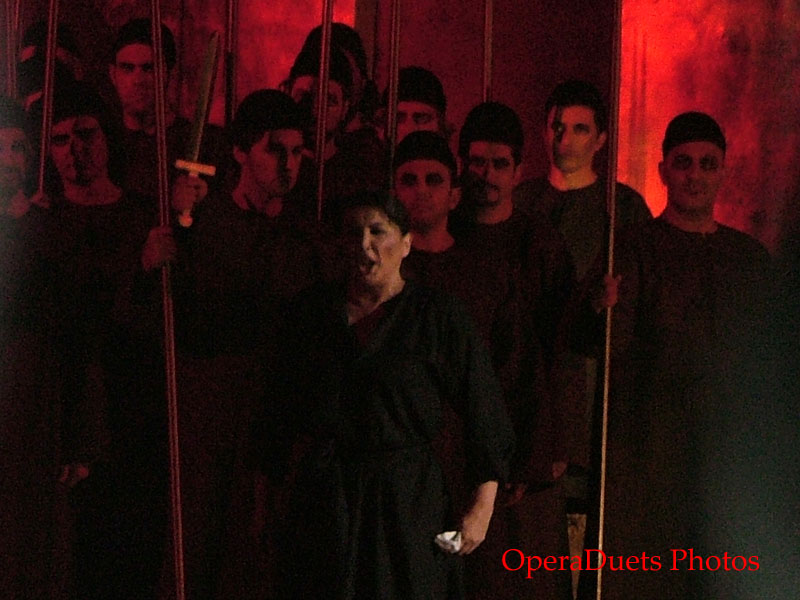
Nabucco
Dramma lirico in 4 acts by
Giuseppe Verdi
Libretto by Temistocle Solera
opera and synopsis
Arena
29 June 2007 at 21.15
Season Tickets
Principal Conductor Daniel Oren
Director Denis Krief
Scenographer Denis Krief
Costume Designer Denis Krief
Choir Master Marco Faelli
Director of the Corps de Ballet Maria Grazia Garofoli
Lighting Designer Paolo Mazzon
Director of stage design Giuseppe De Filippi Venezia
Orchestra, Chorus and technicians
from the Arena di Verona
Now Nabucco. Not the same production as two years ago. Leo Nucci was also then Nabucco and Susan Neves was Abigaille. Disappointment, two-fold; the production in 2005 was better, and my seat was better: I could hear better then, and no-one was talking during the show. Having read some review of the production with their pointing out disappointment towards Carlo Colombara and Maria Guleghina, they loved Leo Nucci, of course... so I knew something. And it was announced at the loud-speaker, that Colombara although slightly ill he was still singing. And you could tell he was not in top form but he was steadily better. Maria Guleghina was also weak sounding, but I think that was because of my seat. Had I been sitting in Poltronissimo God section and not (just) poltronissimo then I think my feeling had been better about this production, but I would still have found the ballet thing stupid and wondering why did they put such a boring costume on the wonderful soprano, Maria Guleghina. Fenena and Anna got something beautiful to wear. White for Fenena, red for Anna, but for Abigaille, dark earth colors.
And then singers did not come out where I was standing.
Must have more Maria Guleghina live. Especially as Abigaille....
OD Travel + Photos
Original blog post
Posted by
operaduets
at
Thursday, June 29, 2017
0
comments
![]()
Labels: 06_June, 2007, Carlo Colombara, Fabio Sartori, GIUSEPPE VERDI, Italy, Leo Nucci, Maria Guleghina, NABUCCO, Opera, Verona, Vienna
Wednesday, June 28, 2017
June 28, 2005: Werther in Turin, Italy
2005-06-28 Werther (Massenet), Teatro Regio Torino
Werther = Roberto Alagna
Charlotte = Kate Aldrich
Albert = Marc Barrard
Sophie = Nathalie Manfrino
Bailli = Michel Trempont
Schmidt = Leonard Pezzino
Johann = Armando Gabba
Brühlmann = Alessandro Inzillo
Kätchen = Ivana Cravero
Alain Guingal, conductor
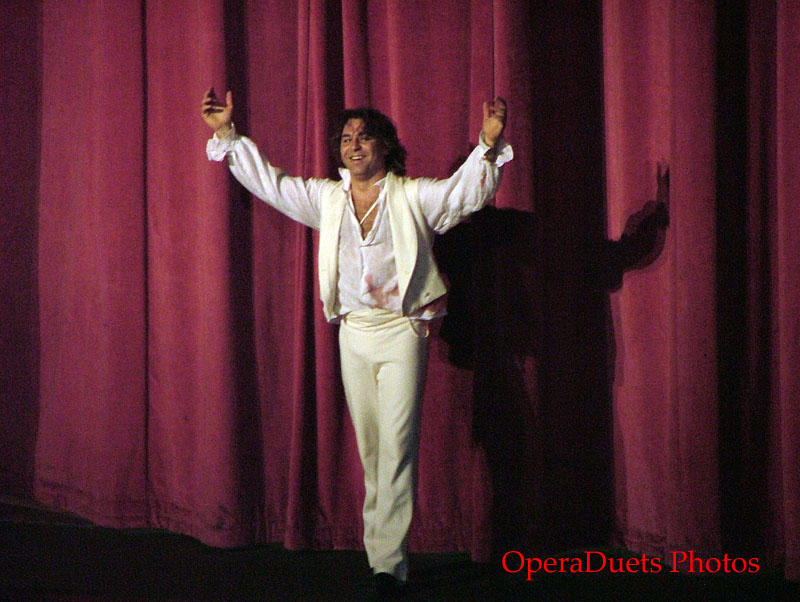
Werther
Libretto di Édouard Blau, Paul Milliet e
Georges Hartmann
dal romanzo Die Leiden des jungen Werther
di Johann Wolfgang Goethe
Musica di Jules Massenet
Gli altri figli del borgomastro, voci bianche
Stefania Costa, Fiammetta Fanari,
Roberta Nobile, Miriam Schiavello,
Giulia Voghera, Carlo Alberto Italia,
Alberto Occelli, Giulio Sanna
Direttore d’orchestra Alain Guingal
Regia e scene David Alagna e Frédérico Alagna
Costumi Louis Désiré
Maestro del coro Claudio Marino Moretti
Orchestra e Coro del Teatro Regio
Elementi del Coro di voci bianche del Teatro Regio e del Conservatorio
“G. Verdi”
Nuovo allestimento Teatro Regio.
Bravo Roberto Alagna!!!!!
Bravi David & Frederico Alagna!!!
Bravi tutti!
Even, bravi dog and horses!!!
First time in Torino for me. The Alagna brothers made this production a feast for the eye and ear. And with Roberto Alagna, their big-brother as the star of the evening it was absolutely magic. Schmidt and Johann visited the home of the Bailiff with a real dog. The dog acted admirably even when the singing was near. Naturally the dog was in a leash and all took care of the big dog. The carriage was with a real horse that took Charlotte and Werther to the ball and back. When Sophie came to the church she was on horseback, not the same horse that had carried the carriage. And was it disturbing the opera in any way? No. It was all perfectly done.
Roberto Alagna et al. was wonderful in their singing and dancing. The children, too. The sets and costumes was beautiful and totally right for Werther. Roberto Alagna was perfect as Werther. Kate Aldrich was totally convincing as Charlotte, which was wonderfully sung. Sophie was also quite marvelous as were Albert. This production with its use of red lightning at special moments in Werther was truly amazing and wonderful...
The perfect Werther!
OD Travel + Photos
Posted by
operaduets
at
Wednesday, June 28, 2017
0
comments
![]()
Labels: 06_June, 2005, Italy, JULES MASSENET, Kate Aldrich, Opera, Roberto Alagna, Turin - Torino, WERTHER
June 28, 2003: Turandot in Verona
2003-06-28 Turandot (G. Puccini), Arena di Verona
Turandot = Giovanna Casolla
Altoum = Aldo Bottion
Timur = Hao Jiang Tian
Calaf = José Cura
Liù = Micaela Carosi
Ping = Marco Camastra
Pong = Iorio Zennaro
Pang = Gianluca Floris
A mandarin = Giuseppe Riva
The prince of Persia = Angel Harkatz
First maidservant = Daniela Forapani
Second maidservant = Antonella D'Amico
Alain Lombard, conductor
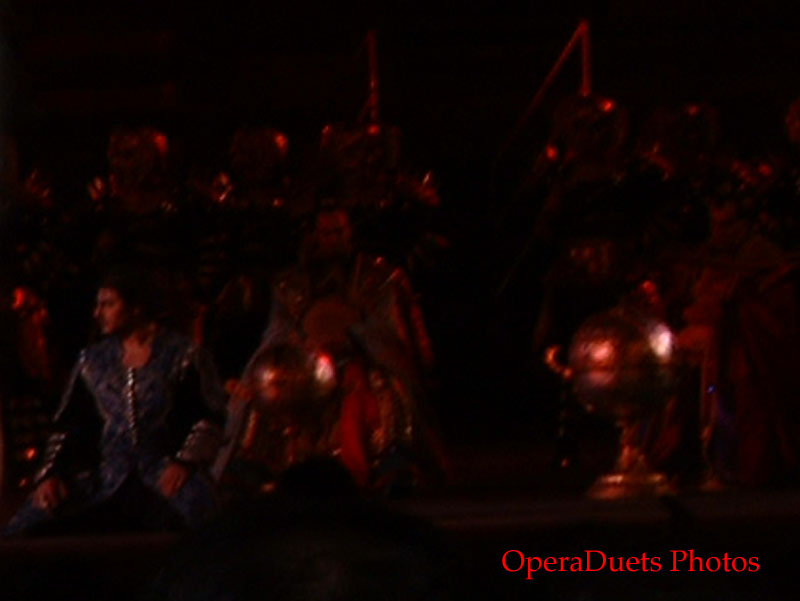
Arena di Verona
28 June 2003 - 21.15
Turandot
Dramma lirico in 3 acts by Giacomo Puccini
Libretto by Giuseppe Adami e Renato Simoni
PRINCIPAL CONDUCTOR Alain Lombard
DIRECTOR Yuri Alexandrov
Assistant Director Tatiana Karpacheva
SCENOGRAPHER Vjacheslav Okunev
COSTUME DESIGNER Vjacheslav Okunev
CHOIR MASTER Marco Faelli
Director of the Corps de Ballet Maria Grazia Garofoli
Light Designer Paolo Mazzon
Director of stage design Giuseppe De Filippi Venezia
Turandot 28.6.2003 with Jose Cura. Jose Cura sang wonderfully, all the bravos (and some shouting of "bis." they sounded more like dislike-shouting, than "Da Capo" in French) after his wonderful Nessun dorma.
It was a colorful, beautiful Turandot. But I did not like all of the directors ideas. The choreography of the crowd was disturbing, and some of the dancing was too. One could be distracted so that one suddenly did not know where Cura was. Cura looked dashing in the soldier-uniform, with all that black hair. It was definitely "there he is!!". But to make Calaf a soldier, was a fault. He is the unknown Prince, who is in exile, trying to hide from his enemies. And certainly as a soldier he would have seen Turandot before. So it was an illogical choice. But he looked great in the silver-armor.
All C´s got al lot of applause, Cura (Calaf), Cassolli (Turandot) and Caresi (Liu). But too much circus in this Turandot, to my taste.
The opera stopped early because of rain, when Turandot sings :"La mia gloria e finita!" We waited a bit, but the weather forecast was not good, so a bit over midnight it was all over. And I went back to my hotel in the rain and in Blitz und Donner!
"Non piangere, Liu!"
OD Travel + Photos
Posted by
operaduets
at
Wednesday, June 28, 2017
0
comments
![]()
Labels: 06_June, 2003, GIACOMO PUCCINI, Giovanna Casolla, Italy, José Cura, Micaela Carosi, Opera, TURANDOT, Verona
June 28, 2002: Jose Cura in Dalhalla
2002-06-28 Opera Concert, Dalhalla, Sweden
José Cura, tenor & conductor
Giuseppina Trotta, mezzo
Sinfonia Varsovia
Pietro Veneri, conductor
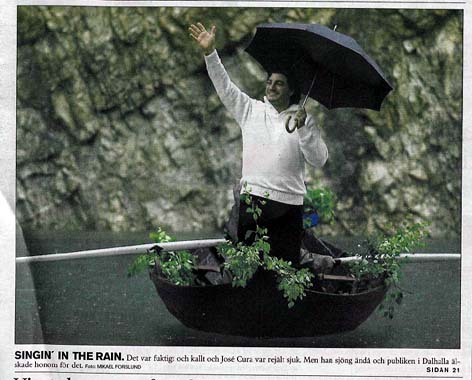
PROGRAM
It begins with a rowboat, and Cura with an umbrella, then he arrives at the stage, jumps up, and begins conducting
Giuseppe Verdi
LA FORZA DEL DESTINO - Ouverture, Cura conducts
Veneri comes out, and conducts Il Corsaro, and Cura does Corsaro in his usual way.
Il CORSARO - Ah si, ben dite - Tutto parea sorridere Cura sings
Giuseppina Trotta joins Cura in this duet. I was disappointed by hearing her, a little voice and the duet did not catch air.
IL TROVATORE - Madre, non dormi Duet: Cura/Trotta
Cura talks to the audience, " you are crazy, sitting in the rain". Telling us as a Latino for him this is Winter. "Wonderful Dalhalla" Then Trotta sings alone. This is not a highlight.
Pietro Mascagni
CAVALLERIA RUSTICANA- Voi lo sapete, o Mamma Trotta
Cura sings Cielo e mar, not just the aria but also its introduction. He is doing alright, he is sick, has a cold.
Amilcare Ponchielli
LA GIOCONDA Cielo e mar (introduction + aria) Cura
The conducting of Forza del Destino was disinteresting, but he made a very good Intermezzo from Manon Lescaut, I have not heard it, so touching as Cura made it. It was really great. He said in his Verdi DVD that Verdi can easily become band-music and he did that to FORZA. But with Manon Lescaut he redeems that fault.
Giacomo Puccini
MANON LESCAUT Intermezzo Cura conducts
Cura is trying to sing O paradiso, it is never apparent in which language he sings it, it sound like a combination of French and Italian, maybe with a Spanish touch. He is sick, maybe that is the reason, or maybe he haven't learnt it properly.
Giacomo Meyerbeer
L'AFRICAINE O, paradiso Cura
Wonderful,in the program it says only the intermezzo, but we also gets Cura singing the song to the Flag (the Argentinean Flag,naturally). It is really touching, but I would to hear it when Cura is vocally on top, too.
Hector Panizza
AURORA Intermezzo epico Veneri conducts
Cancion de la Bandera Cura
Intermission
Cura talks again, this time about AURORA, and the song of the flag, National Song of Argentina. It is the first time it was sung outside Argentina, Cura said. And he saw the Argentinean Flag when he was singing it. Very touching. I looked up and I saw an umbrella, with white and the light-blue of the Argentinean flag, so I know what he saw. (But I was wrong there was Argentinean flags there as one Argentine who lives in Sweden told me in an e-mail. But I did not see it). Then it the Girl of the Golden West, Cura conducts, and then after it is over the Prelude, Veneri have to "fight" with Cura in order to get the baton. And then Cura have to make an excuse to the audience for having blown his noise for open mike in the first part. And then it is "Ch'ella mi creda". Again he sings the introduction to the aria too (seldom done in concerts)
Giacomo Puccini
LA FANCIULLA DEL WEST Prelude Cura conducts
Ch'ella mi creda Cura sings, Veneri conducts
Veneri conducts a wonderful Bacchanale, then Trotta sings the seduction-aria, and in the end of the aria, Cura comes out, and sings "Dalila, je t'aime" .
Camille Saint-Saëns
SAMSON ET DALILA Bacchanale
"Mon coeur s'ouvre à ta voix Trotta / Cura
Veneri is a good conductor, and Trotta was much better in the Carmen section than anything else. Cura had really a cold, but with a careful use of his voice, out came one of the finest interpretation of the Flower Aria. Then the end-duet, and Cura was so sick, he had to fight with himself not to cough in the wrong musical moment, concentrate to have his throat ready when the duet need Don José. Most singers would have said to the audience, I am sick, this duet is too much for me today. And nobody would have thought less of Cura had he done that. (It was his right, and maybe his obligation to do so)
Georges Bizet
CARMEN Prelude
Habanera Trotta
La fleur que tu m'avais jetée Cura
Entr'acte, act 4
C'est toi, c'est moi Trotta / Cura
EXTRA
Addio, fiorito asil (MADAMA BUTTERFLY) Cura
Seguedilla (CARMEN) Trotta / Cura
Nessun dorma (TURANDOT) Cura
Who would have thought that we would get extra-numbers. I thought that in case of extras, it would have been Trotta and Veneri who would have to do it, Cura needed rest. But he sang one of the shortest arias, Addio fiorito asil, I think it is not really an easy aria, even if it is being short. Trotta sang Seguedilla and Cura came in as Don José does in the opera. Then HE ended it all with Nessun dorma, it wasn't necessary, but we loved it. As the absolute end of the show, this Gala concert, he made us applaud every section and every musician in the Sinfonia Varsovia. The Concert ended at 22.00
JOSÉ CURA IN DALHALLA
Friday 28:th - 19.00-21.30 - Open 17.00
José Cura, tenor and conductor
Giuseppina Trotta, mezzo soprano
Sinfonia Varsovia
Assistant Conductor: Pietro Veneri
OD Travel
Posted by
operaduets
at
Wednesday, June 28, 2017
0
comments
![]()
Labels: 06_June, 2002, Concert, Dalhalla, Giuseppina Trotta, José Cura, Sweden
Tuesday, June 27, 2017
June 27, 2006: L'Italiana in Algeri, Vienna
2006-06-27 L'Italiana in Algeri (Rossini), Wiener Staatsoper
Mustafà = Kristinn Sigmundsson
Elvira = Bori Keszei
Zulma = Michaela Selinger
Haly = Marcus Pelz
Lindoro = Juan Diego Flórez
Isabella = Agnes Baltsa
Taddeo = Alfred Šramek
Maurizio Benini, conductor
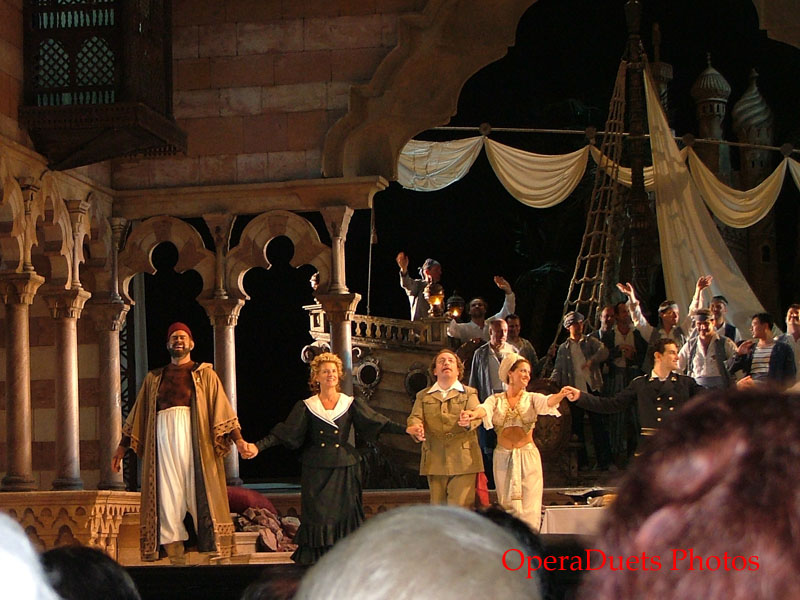
27. Juni 2006
L'ITALIANA IN ALGERI
(65. Aufführung in dieser Inszenierung)
Musikalische Leitung: Maurizio Benini
nach einer
Inszenierung von: Jean-Pierre Ponnelle
Chorleitung: Ernst Dunshirn
Isabella: Agnes Baltsa
Beginn: 19.30
A wonderful Italiana in Wiener Staatsoper with Agnes Baltsa as the best Isabella, Juan Diego Florez wonderful as Lindoro, and Kristinn Sigmundsson was good as Mustafa. Bori Keszei as Elvira was not the best Elvira I have seen and Michaela Selinger as Zulma was also just good enough. Alfred Sramek was as usual wonderful as Taddeo. Italiana in Algeri is a wonderful production. But personally I think that with someone like Ferruccio Furlanetto or Ruggero Raimondi as Mustafa it would have been even better. Florez was the most applauded person with Agnes Baltsa as the second most applauded. Personally I could not find any error in Agnes Baltsa's singing, she sang just most wonderfully. Perfection.
OD Travel + Photos
Posted by
operaduets
at
Tuesday, June 27, 2017
0
comments
![]()
Labels: 06_June, 2006, Agnes Baltsa, Austria, GIOACCHINO ROSSINI, ITALIANA IN ALGERI, Juan Diego Florez, Opera, Vienna
June 27, 2003: Carmen in Vienna
2003-06-27 Carmen (G. Bizet), Wiener Staatsoper
Carmen = Agnes Baltsa
Don José = Julian Gavin
Escamillo = Ildar Abdrazakov
Micaëla = Krassimira Stoyanova
Frasquita = Simina Ivan
Mercédès = Cornelia Salje
Zuniga = Goran Simic
Moralès = Yu Chen
Remendado = Walter Pauritsch
Dancaïro = Hans Peter Kammerer
Lillas Pastia = Csaba Markovits
Vjekoslav Sutej, conductor
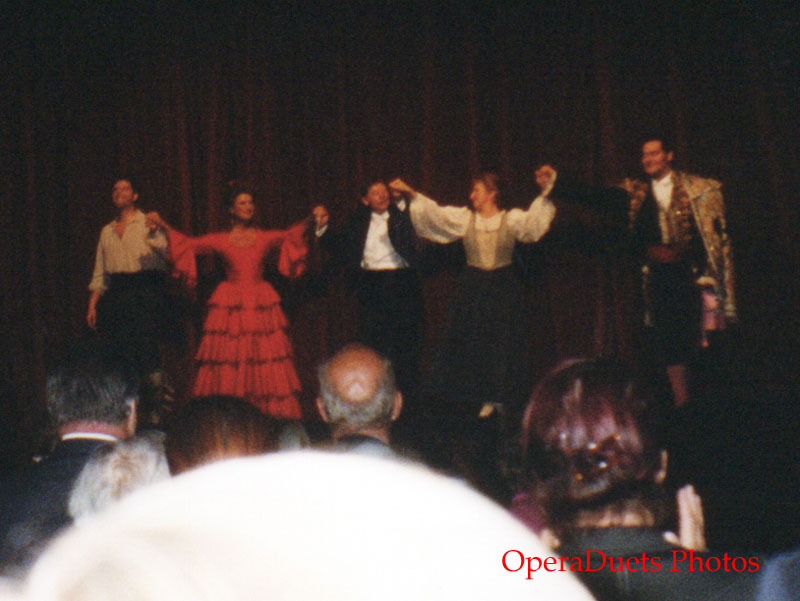
Wiener Staatsoper
freitag, 27. juni 2003
113. Aufführung in dieser Inszenierung
Carmen
Oper in vier Akten von Henri Meilhac und Ludovic Halévy nach einer Novelle von Prosper Mérimée
Musik von Georges Bizet
Dirigent Vjekoslav Sutej
Inszenierung und
Bühnenbild Franco Zeffirelli
Kostüme Leo Bei
Choreographie Rafael de Cordova
Chorleitung Ernst Dunshirn
.,
Tänze Patricia Sollak
Rudolf Wächter
Christoph Wenzel
und das Corps de ballet
23 degree Celsius. Life is good. I meet another Baltsa fan in Arcadia Opera Shop, she is working there. 16.30 Edita Gruberova Autogramm-stunde in Arcadia.
I got just in time (1500) for a Guided Tour in the Staatsoper, it was not my first time. But I enjoyed it nevertheless. In Staatsoper, it was Edita-Gruberova-Austellung in Gustav-Mahler-saal, we saw the Carmen-scenery in the audience. And the tour ended in Arcadia Opera Shop, I stood in line for an autograph, bought the Lucia di Lammermoor with Gruberova/Josep Bros so she could have something to write on. I took photos, of course. A hot day for Gruberova to sit inside, they had to open more doors, and stand garde so no one would enter the shop that way.
Then it was Carmen with Agnes Baltsa and Julian Gavin. 1900-2215. I guess I was not in the mood to be overwhelmed. It was a very good, but not great performance. I love this opera, and Baltsa as Carmen is always special. But anyway the audience loved it. The performance was not exactly the same as the last time, I guess Julian Gavin took
some of his Carmen-expericed from Zurich with him. Agnes Baltsa did her death-scene differently, it was very effective. Julian Gavin was OK as Don Jose, I would have loved a better pronunciation of the French when speaking, but also in singing. You had to know what Don Jose was saying, if you didn´t you got lost. Agnes Baltsa was always clear in her pronunciation, if I knew the French language better I would know if it was pronounced correctly. But for my ears it was correct.Beside this Carmen is wild, her pronunciation should not be terribly correct. Krassimira Stoyanova was embraced by the Vienna audience. And this Escamillo, Ildar Abdrakov was great. I loved the
sweet soprano voice of Simina Ivan (Frasquita).
I stood long in line to wait for Agnes Baltsa, by 2300 I had to go to Westbahnhof since my train was leaving 23.25, and I had to collect my luggage first, too. Then I saw the sign, 40 min's late change to 55 and in the to 120 min's. Had I known this I could have waited longer for Baltsa, and maybe Baltsa would have come, or maybe not. So it was over 0100 when the train came to Vienna Westbahnhof.
OD Travel + Photos
Posted by
operaduets
at
Tuesday, June 27, 2017
0
comments
![]()
Labels: 06_June, 2003, Agnes Baltsa, Austria, CARMEN, Ildar Abdrazakov, Julian Gavin, Krassimira Stoyanova, Opera, Vienna
Monday, June 26, 2017
June 26, 2006: Werther in Vienna
2006-06-26 Werther (Massenet), Wiener Staatsoper
Werther = Marcus Haddock
Albert = Morten Frank Larsen
Le Bailli = Janusz Monarcha
Charlotte = Elina Garanca
Sophie = Ileana Tonca
Schmidt = Benedikt Kobel
Johann = Clemens Unterreiner
Marco Armiliato, conductor
Werther (Massenet), Wiener Staatsoper
Dirigent: Marco Armiliato
Inszenierung: Andrei Serban
Bühne: Peter Pabst
Kostüme: Peter Pabst, Petra Reinhardt
Choreinstudierung: Ernst Dunshirn
Beginn: 19.30
The tenor Marcus Haddock looked quite like Marcelo Alvarez and acted as him too. His singing was not at the level as Marcelo Alvarez. The costumes looked false on him, and I could not understand how anyone could fall in love with him. I am sure Alvarez would have made one forget the costumes which was OK for all the others but Werther. Elina Garanca has the most gorgeous mezzo soprano voice. She was absolutely wonderful. Ileana Tonca sang Sophie also wonderfully, Albert was great. But then it was the direction which I think really made this Werther production something I cannot like. It was the Postmodern Ironie. Werther is an idiot, he should more be poetic. Charlotte was just a BIG EGO, she should really care for the children, instead she is more looking in the mirror, making her make-up perfect. Sophie is the one really tending the children, but she should be the second care-taker of the children. There is too many children in that household.
The singing was wonderful, but the REGIE was just about reading WERTHER the false way. Here you have great singers that can act well but chose to make most of what people say into falsehood. It was really depressing. This opera doesn't need that kind of help.
OD Travel
Posted by
operaduets
at
Monday, June 26, 2017
0
comments
![]()
Labels: 06_June, 2006, Austria, Elena Garanca, JULES MASSENET, Marcus Haddock, Opera, Vienna, WERTHER
June 26, 2005: Aida in Verona
2005-06-26 Aida (Verdi), Arena di Verona
The King = Marco Spotti
Amneris = Tichina Vaughn
Aida = Micaela Carosi
Radamès = José Cura
Ramfis = Vitalji Kovaliov
Amonasro = Alberto Mastromarino
A messenger = Carlo Bosi
High Priestess = Antonella Trevisan
Daniel Oren, conductor
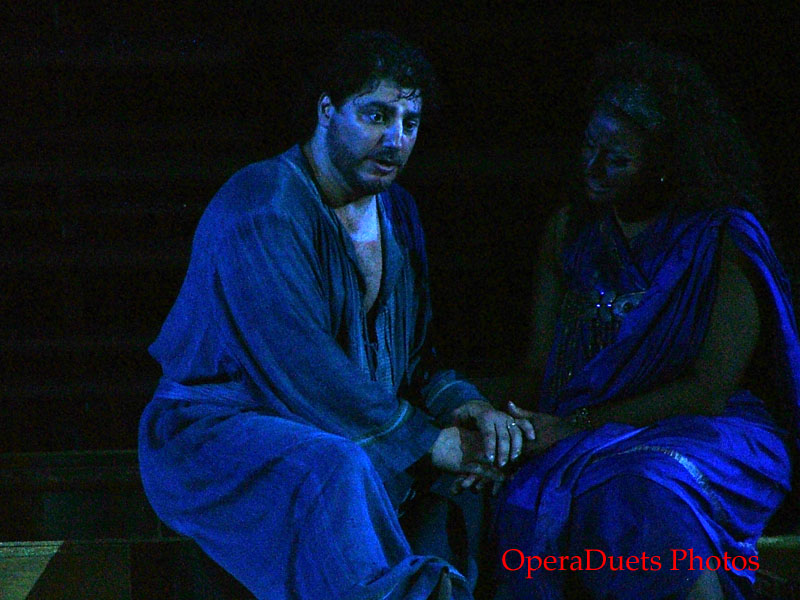
Arena
26 June 2005 - 21.15
Aida
Opera in 4 acts by Giuseppe Verdi
Libretto by Antonio Ghislanzoni
PRINCIPAL CONDUCTOR Daniel Oren
DIRECTOR Franco Zeffirelli
SCENOGRAPHER Franco Zeffirelli
COSTUME DESIGNER Anna Anni
Wonderful!!!
I could have had another opera the day before, La Gioconda (June 25) but I decided to rest in Hotel Tryp Verona. I think that was wise. June 26 at 1830 I took the Opera Bus to Verona (Castelvecchio) and as before I ate some dinner at Cafe Opera before the opera started. This time too I saw no JCx friends before I too was inside the Arena, even more friends this time.
And I sat on the front row and this was an even better Aida, almost perfect. Again it was the conductor's tempi (too fast at delicate places in Aida). I could see the conductor from my place, in my opinion he was too preoccupied with the orchestra and looked seldom up to the singers.
But still the singers was better, the conductor was also a bit kinder to the singers. Another Ramfis this time, Vitalji Kavaliov, also doing quite well. Indeed they were all doing very well despite this time there was a few times when they almost sang wrong. But this was a more energetic Aida and better acted. Alberto Mastromarino as Amonasro was doing well although he was not so exact as on June 23.
Better last act certainly. Wonderful AIDA!!!
OD Travel + Photos
Posted by
operaduets
at
Monday, June 26, 2017
0
comments
![]()
Labels: 06_June, 2005, AIDA, GIUSEPPE VERDI, Italy, José Cura, Micaela Carosi, Opera, Tichina Vaughn, Verona
June 26, 2002: Carmen in Vienna
2002-06-26 Carmen (G. Bizet), Wiener Staatsoper
Carmen = Agnes Baltsa
Don José = Richard Leech
Escamillo = Egils Silins
Micaëla = Anja Harteros
Frasquita = Simina Ivan
Mercedes = Stella Grigorian
Zuniga = Goran Simic
Morales = Yu Chen
Remendado = Walter Pauritsch
Dancairo = Markus Nieminen
Lillas Pastia = Csaba Markovits
Jun Märkl, conductor
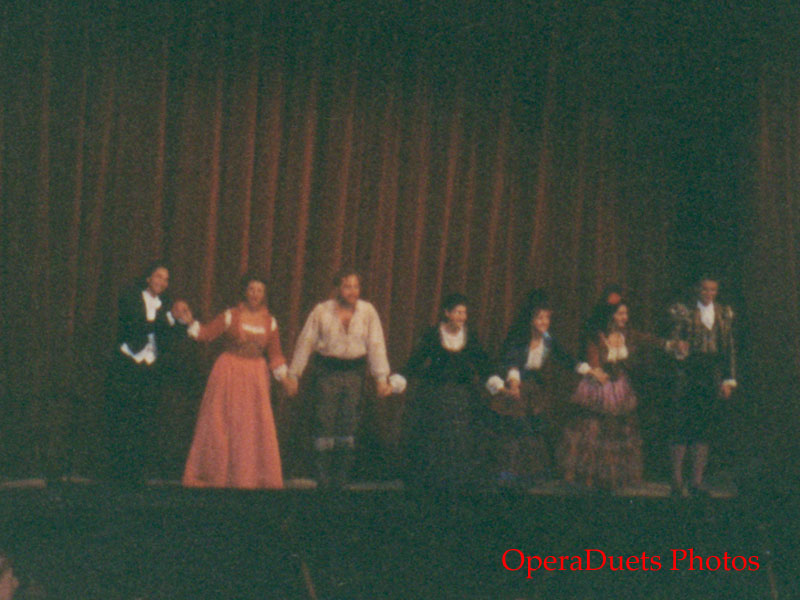
WIener Staatsoper
mittwoch, 26. juni 2002
107. Aufführung in dieser Inszenierung
Carmen
Oper in vier Akten (nach Prosper Mérimée) von H. Meilhac und L. Halévy
Musik von Georges Bizet
Dirigent Jun Märkl
Inszenierung und
Bühnenbild Franco Zeffirelli
KostümeLeo Bei
Choreographie Rafael de Cordova
Chorleitung Ernst Dunshirn
,
Tänze Rita Kommentisch
Rudolf Wächter
Christoph Wenzel
und das Corps de ballet
(A) Stipendiat des Herbert von Karajan Centrums
This time I will never forget the great duet at the end of the opera.
Carmen on June 26th, was the most memorable erlebnis than June 23rd.
No fault this time for the trumpeter in act 1. Agnes Baltsa seemed to be in a special mood. She did many thing she didn't do June 23rd. She was special. Unfortunately was the Escamillo Egils Silins not a better Escamillo today. Anja Harteros was still happily applauded with shouts of Bravo. Richard Leech and Agnes Baltsa seemed get better together. The duet "C'est toi!" was incredible. And it was murder on the stage, really shocking, believable. Simina Ivan and Stella Grigorian must be the best Frasquita/Mercedes I have ever seen.
Then the opera was over. I had my camera, with my small flash. But there were "big guns" there, flashed the lit out the almost the whole floor. Many flashes. AGNES BALTSA is GREEK, the diva reacts with fire, some threatening gestures to the parts of the audience, which she think is guilty. I felt myself being struck by lightening, even though my small camera, is just a little baby. Short small flash. Then AGNES BALTSA knows what to do, she must remember the most of the audience is innocent, and so she smiles and raises her arms in a gesture of thank-you.
I definitely do not dare to try to take a picture of Agnes Baltsa as she leaves the operahouse. Besides I don't have the time. I have trains to catch, I am going back to Scandinavia, and on June 28th I will see José Cura in Dalhalla, Sweden.
OD Travel + Photos
Posted by
operaduets
at
Monday, June 26, 2017
0
comments
![]()
Labels: 06_June, 2002, Agnes Baltsa, Anja Harteros, Austria, CARMEN, Egils Silins, GEORGES BIZET, Opera, Richard Leech, Vienna
June 26, 1997: Aida in Vienna
1997-06-26 Aida (Verdi), Wiener Staatsoper
Re D'Egitto = David Cale Johnson
Amneris = Waltraud Meier
Aida = Deborah Voigt
Radames = Kristjan Johannsson
Ramphis = Kurt Rydl
Amonasro = Simon Estes
Un Messagero = Franz Kasemann
Sacedotessa = Marjorie Vance
Marcello Viotti, conductor
Aida
Oper in vier Akten von Antonio Ghislanzoni
Musik Giuseppe Verdi
Dirigent Marcello Viotti
Nach einer Inszenierung von Nicolas Joel
Ausstattung Carlo Tommasi
Choreographie Jan Stripling
Chorleitung Dietrich D. Gerpheide
Die Handlung spielt in Theben
zur Zeit der pharaonen
Ballett: 2. Bild Das Corps de ballet
3. BildEva Polacek
Claudia Stocker
Silvia Tzankova
4. Bild Irina Lebedjewa
Wolfgang Grascher Christian Herden Christian Rovny
und das Corps de ballet
Eleven der Ballettschule
der Österreichischen Bundestheater Bühnenorchester
der Österreichischen Bundestheater
A wonderful Aida with Deborah Voigt in good voice. A great cast and a wonderful production. Many tourists in the State Opera, many Japanese kimonos to see.
The moment I remembered the most is when Waltraud Meier went down the steep stairs and then there was a big flash from a camera. My heart almost stopped, that could have been very dangerous for Waltraud Meier. But she got down still whole.
I have seen an opera performance with so many camera flashes while the performance lasted. Usually people have the wits to wait until the applause.
OD Travel
Posted by
operaduets
at
Monday, June 26, 2017
1 comments
![]()
Labels: 06_June, 1997, AIDA, Austria, Deborah Voigt, GIUSEPPE VERDI, Kristjan Johansson, Kurt Rydl, Opera, Vienna, Waltraud Meier
Sunday, June 25, 2017
June 25, 2006: Verismo Gala in Miskolc
2006-06-25 Verismo Gala, Miskolc Operafestival
Agnes Baltsa, mezzo
Mirolav Dvorsky, tenor
Natasa Kátai, soprano
Paolo Gavanelli, baritone
Miskolc Symphonic Orchestra
János Ács, conductor
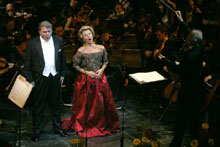
7 pm, Grand Theatre
Verismo Gala
Miskolc Symphonic Orchestra
Host: Ferenc Baranyi
Conducted by: János Ács
Directed by: Imre Halasi
Verismo Gala, Miskolci Nemzetközi Operafesztivál
Agnes Baltsa, mezzo
Miroslav Dvorsky, tenor
Paolo Gavanello, baritone
Natasa Kátai, soprano
SO I guess you want to know was it worth it: YES. Agnes Baltsa was great she sang, of course the Santuzza aria (Voi lo sapete, o mamma) and the duet with Turriddu (no surprise there) but it did not end there, when Turriddu (Miroslav Dvorsky) went out, the music continued and then Paolo Gavanello came it and then it became the duet Santuzza/Alfio (not often a concert piece). IT WAS WONDERFUL!!!
First part was the Cavalleria Rusticana / Pagliacci arias, duets. It started with Pagliacci Prolog which was very appropriate. The second part was the more unknown operas/arias. Started with what was probably something from the opera L'Amico Fritz, then Paolo Gavanello sang aria (CILEA?), it was the aria from Catalani's LA WALLY, Lamento di Federico. Gavanello sang Nemico della Patria (ANDREA CHENIER).... and finally Baltsa came and it was CARMEN, Seguedilla, Miroslav Dvorsky sang the flower aria, and the Verismo Gala ended with the Carmen duet, and when Carmen died it was over.
No extra numbers, nothing. But then my friend told me that it was something happening inside the house, an reception. So we went there. Eva Marton was there, and soon came Agnes Baltsa, Dvorský etc. Of course there was wine, food, and many other people. It was speeches, and naturally Agnes Baltsa was the toast. And I even got a chance to talk to her. I never got a chance to take a photo. Not in the theatre, the usher turned me down. And in the reception it never seemed to be the right thing to do. I could naturally just have asked Agnes Baltsa, I think she might have said yes. But it was enough somehow to be near.
BRAVA, AGNES BALTSA!!
PROGRAMME
1. Leoncavallo: PAGLIACCI - Prologo - "Si puo?" - PAOLO GAVANELLO, baritone
Hungarian
2. Leoncavallo: PAGLIACCI - "Qual fiamma avea nel guardo!" - "Stridono lassù" - Natasa Kátai, soprano
3. Mascagni: CAVALLERIA RUSTICANA - "Voi lo sapete, o mamma" - Agnes Baltsa, mezzo
4. Mascagni: CAVALLERIA RUSTICANA - "Mamma, quel vino è generoso" - Miroslav Dvorsky, tenor
Hungarian
5. Mascagni: CAVALLERIA RUSTICANA - Intermezzo
6a. Mascagni: CAVALLERIA RUSTICANA - "Tu qui, Santuzza" - Miroslav Dvorsky, tenor
& Agnes Baltsa, mezzo
6b. Mascagni: CAVALLERIA RUSTICANA - "Iddio vi manda, compar Alfio" - Agnes Baltsa, mezzo & Paolo Gavanello, baritone
interval
7. Mascagni: L'AMICO FRITZ - Intermezzo
Hungarian
8. Ponchiello: LA GIOCONDA - "O monumento" - Paolo Gavanello, baritone
9. Catalani: LA WALLY - "Ebben! Ne andrò lontana" - Natasa Kátai, soprano
10. Puccini: IL TABARRO - "Nulla! Silenzio!" - Paolo Gavanello, baritone
Hungarian
11. Cilea: ADRIANA LECOUVREUR - "Io son l' umile ancella" - Natasa Kátai, soprano
12. Cilea: L'ARLESIANA - "E' la solita storia del pastore" - Miroslav Dvorsky, tenor
13. Giordano: ANDREA CHENIER - "Nemico della patria" - Paolo Gavanello, baritone
Hungarian
14. Bizet: CARMEN - "Près des remparts de Seville" - Agnes Baltsa, mezzo
15. Bizet: CARMEN - "La fleur que tu m'avais jetée" - Miroslav Dvorsky, tenor
Hungarian
16. Bizet: CARMEN - "C'est toi? - C'est moi" - Agnes Baltsa, mezzo & Miroslav Dvorsky, tenor
OD Travel
Posted by
operaduets
at
Sunday, June 25, 2017
0
comments
![]()
Labels: 06_June, 2006, Agnes Baltsa, Concert, Gala, Hungary, Miroslav Dvorsky, Miskolc, Natasa Katai, Paolo Gavanello
June 25, 2000: Carmen in Zurich
2000-06-25 Carmen (G. Bizet), Opernhaus Zurich
Carmen = Agnes Baltsa
Don José = Gösta Winbergh
Micaëla = Elena Mosuc
Escamillo = Cheyne Davidson
Frasquita = Eun -Yee You
Mercedes = Irene Friedli
Zuniga = Jozsef Dene
Remendado = Volker Vogel
Dancairo = Simon Jaunin
Morales = Peter Kalman
Lillas Pastia = Adriano
Jacques Delacôte, conductor
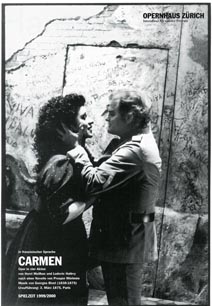
Musikalische Leitung JACQUES DELACÔTE
Inszenierung/Bühnenbild JEAN-PIERRE PONNEllE
Spielleitung GRISCHA ASAGAROFF
Kostüme WERNER JUHRKE
Lichtgestaltung JAKOB SCHLOSSSTEIN
Chor ERNST RAFFElSBERGER
Dancairo SIMON JAUNIN°
Bergführer JONAS VEYA
1.. Leutnant MANUEL ADARVE
2. Leutnant THOMAS PÜTZ
Manuelita RENATE BLUM
0 Mitglied des Internationelen Opernstudios
CHOR DES OPERNHAUSES ZÜRICH ZUSATZCHOR OPERNHAUS ZÜRICH KINDERCHOR DES OPERNHAUSES STATISTENVEREIN AM OPERNHAUS ZÜRICH
ORCHESTER DER OPER ZÜRICH
Verlag: All,or-Edition Kassel
Kritische Neuausgabe nach den Quellen von Fritz Oeser
,Sonntag, 25. Juni 2000Migros-Abo B
Lichtpausen nach dem 1.. und 3. Alu Pause nach dem 2. Akt
Beginn: 20.00 Uhr
Opernhaus Zurich, Carmen, Agnes Baltsa, Gosta Winbergh, Elena Mosuc, Cheyne Davidson
Jacques Delacote had used all his patience on Werther, and had none for Carmen. The prelude of Carmen was played extremely fast, painful. I had taken night-train to Zurich, and already had one opera, and this inpatient conductor. Carmen Opriseanu had replaced Vesselina Kasarova as Charlotte in Werther (and it was a lucky choice for my ears and eyes), but Gösta Winbergh was replacing José Cura as Don José... I was disappointed, I had wondered about Cura being Don José, and to see Cura with Agnes... I admired Winbergh, but he is not my Don José. I was also disappointed about Agnes Baltsa, maybe I was too tired, and I don't like the Zurich production of Carmen, it have lost it charms. (... and God, was I tired when I came to my hotel room!)
And this was my only chance to see the great Swedish tenor live (or indeed alive, since he is dead now) SAD....
OD Travel
Posted by
operaduets
at
Sunday, June 25, 2017
0
comments
![]()
Labels: 06_June, 2000, Agnes Baltsa, CARMEN, Cheyne Davidson, Elena Mosuc, GEORGES BIZET, Gösta Winbergh, Not José Cura, Opera, Switzerland, Zurich
June 25, 2000: Werther in Zurich
2000-06-25 Werther (J. Massenet), Opernhaus Zurich
Werther = Francisco Araiza
Albert = Alfred Muff
Le Bailli = Rudolf A. Hartmann
Charlotte = Carmen Opriseanu
Sophie = Dawn Kotoski
Jacques Delacôte, conductor
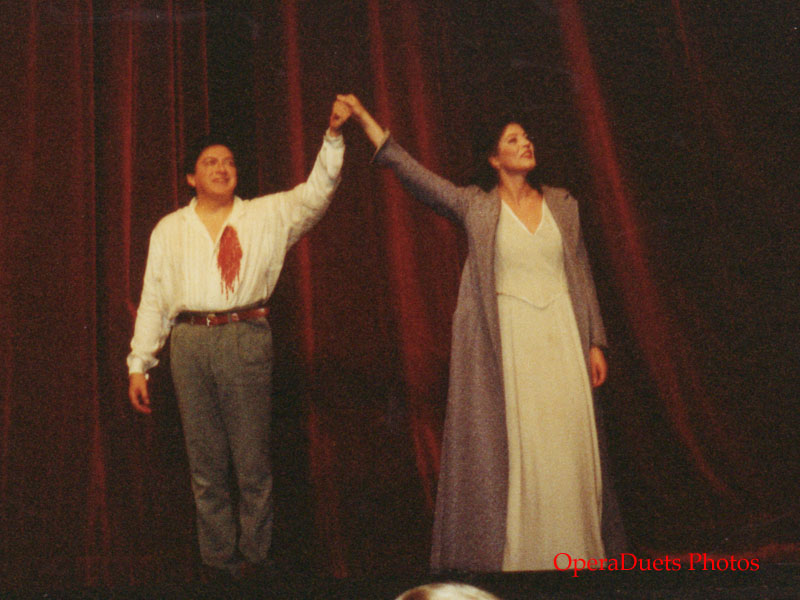
Musikalische Leitung JACQUES DELACÔTE
Inszenierung nnd Bühnenbild MARCO ARTURO MARELLI
Spielleitung CLAUDIA BLERSCH
Kostüme DAGMAR NIEFIND-MARELLI
Lichtgestaltung ROBERTUS CREMER
Chor JÜRG HÄMMERLI
KINDER CHOR DES OPERNHAUSES ZUSATZCHOR OPERNHAUS ZÜRICH STATISTENVEREIN AM OPERNHAUS
ORCHESTER DER OPER ZÜRICH
Solocello Claudius Herrmann
Solovioline Ada Pesch
Musikalische Assistenz
und Einstudierung KELLY THOMAS, HERVE MAHE
Organisation und
Betreuung der Kinder SUSY SIEGRIST, CHRISTINE KRISZUN
lnspizienz SUSANN ZAHLER
Souffleuse URSULA MORI
Verlag. Editions Heugel, Paris
Sonntag, 25. Juni 2000UBS-Abo
Pause nach dem 2. Akt
Beginn: 14.00 Uhr Ende: ca. 16.30 Uhr
Opernhaus Zurich, Werther, Francisco Araiza, Carmen Opriseanu
Act 1 - Spring
Act 2 - Summer
Act 3 - Autumn
Act 4 - Winter.
Another version of Werther, some persons was deleted from the opera, only the principals remained, (deleted: Schmidt, Johann, Brühlmann and Kätchen). Colorful production.
OD Travel + Photos
Posted by
operaduets
at
Sunday, June 25, 2017
0
comments
![]()
Labels: 06_June, 2000, Carmen Opriseanu, Francisco Araiza, JULES MASSENET, Opera, Switzerland, WERTHER, Zurich
Saturday, June 24, 2017
June 24, 2006: Pagliacci in Miscolc
2006-06-24 Pagliacci (Leoncavallo), Miskolc Operafestival
Canio = Daniel Magdal
Nedda = Mariana Colpos
Tonio = Oleg Ionese
Silvio = Iordache Basilic
Beppe = Marius Manea
Adrian Morar, conductor
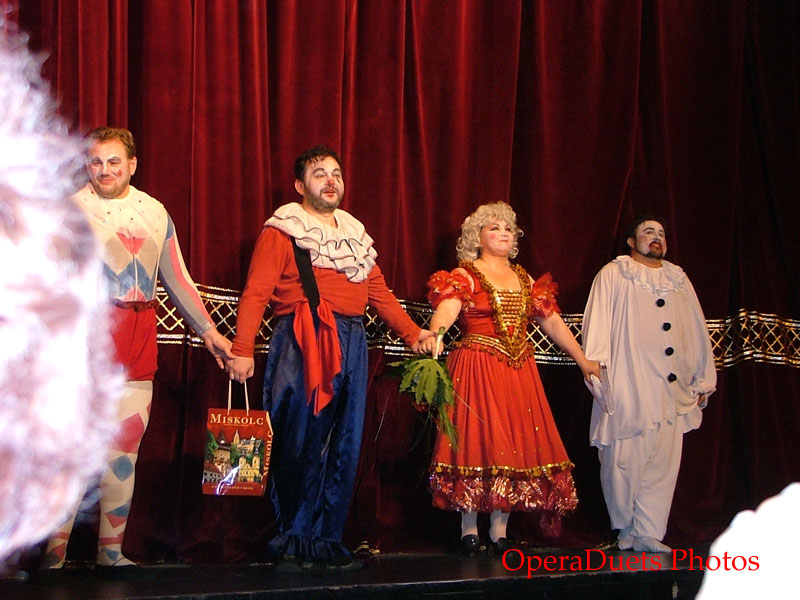
Ruggero Leoncavallo: I Pagliacci
Opera in two acts with prologue in Italian
Canio - Daniel Magdal, Nedda - Roxana Briban (Mariana Colpos?)
Conducted by: Adrian Morar
Directed by: Stefan Neagrau, based on the work of Franco Zeffirelli
The story is set in Calabria , south-Italy, in 1865.
This was a better role for Daniel Magdal, he was great in Vesti la giubba. Nedda was also wonderful. Beppe was wonderful. Tonio was good. Silvio was also very good. And I was at tears in the end. All my sympathy was for Canio.
OD Travel + Photos
Posted by
operaduets
at
Saturday, June 24, 2017
0
comments
![]()
Labels: 06_June, 2006, Daniel Magdal, Hungary, Mariana Colpos, Miskolc, Opera, PAGLIACCI, Roxana Briban, RUGGERO LEONCAVALLO
June 24, 2006: Cavalleria Rusticana in Miscolc
2006-06-24 Cavalleria Rusticana (Mascagni), Miskolc Operafestival
Santuzza = Sorina Munteanu
Lola = Sidonia Nica
Turiddu = Daniel Magdal
Alfio = Ionut Pascu
Lucia = Adriana Alexandru
Adrian Morar, conductor
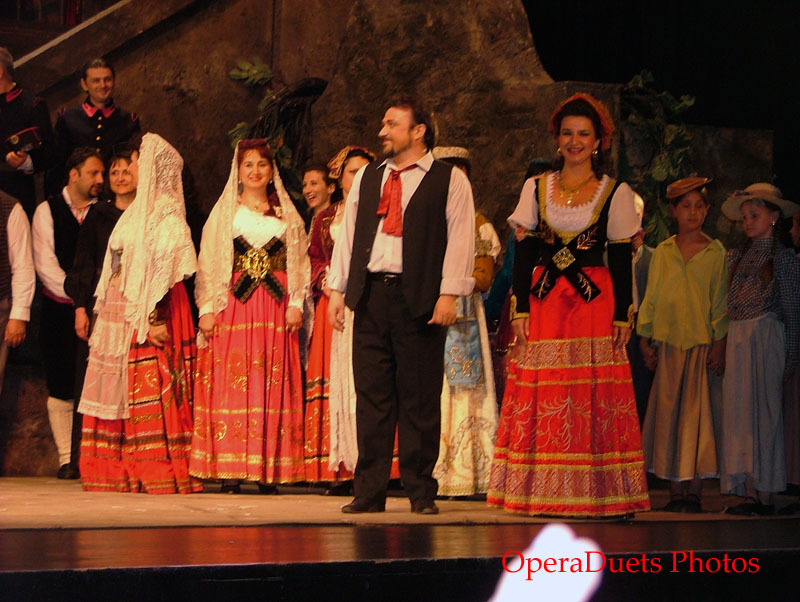
7 PM, Grand Theatre
Guest performance of the Bucharest National Opera
Pietro Mascagni: Cavalleria Rusticana
Opera in one act in Italian
Libretto - adapted from Giovanni Verga by Giovanni Targioni-Tozzetti
and Guido Menasci
Conducted by: Adrian Morar
Directed by: Cristina Cotescu, based on the work of Franco Zeffirelli
It was really a wonderful Cavalleria Rusticana, no wonder since it was based on Zeffirelli. Daniel Magdal had trouble with his top notes, he was not in his best in the O Lola - romance, but he grew better. Sorina Munteanu was admirable Santuzza, a true mezzo, when
she sang in the soprano area she was still a very good, but I think I would have loved to hear her as Princess Eboli in Verdi´s Don Carlo. Alfio was a young and beautiful baritone, a little to light a voice for the duet with Santuzza. Lola was wonderful. And Lucia was
also good.
OD Travel + Photos
Posted by
operaduets
at
Saturday, June 24, 2017
0
comments
![]()
Labels: 06_June, 2006, CAVALLERIA RUSTICANA, Daniel Magdal, Hungary, Miskolc, Opera, PIETRO MASCAGNI, Sorina Munteanu
June 24, 2005: Aida in Parma
2005-06-24 Aida (Verdi), Teatro Regio Parma
Il re d’Egitto = Enrico Turco
Amneris = Luciana D’Intino
Aida = Daniela Dessí
Radamès = Fabio Armiliato
Ramfis = Mario Lupero
Amonasro = Juan Pons
Una sacerdotessa = Tiziana Tramonti
Un messaggero = Carlo Bosi
Maestro concertatore e direttore
BRUNO BARTOLETTI
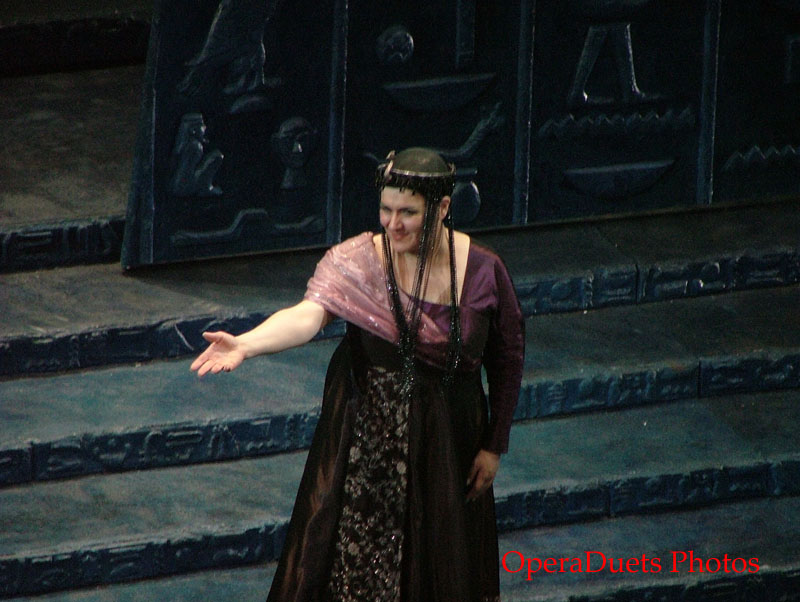
Regia
ALBERTO FASSINI
Scene e Costumi
MAURO CAROSI
Coreografia
MICHA VAN HOECKE
Maestro del coro
MARTINO FAGGIANI
ORCHESTRA E CORO DEL TEATRO REGIO DI PARMA
A wonderful Aida!!!!
Luciana D'Intino is a wonderful Amneris, very charismatic and a strong voiced woman, a great actress, you feel that this is a real person. Daniela was a superb Aida. Fabio Armiliato was a great Radames, even though his voice seems a bit rough and not quite the same quality as Daniela Dessi. Juan Pons is a great Amonasro although he is no longer quite in his prime but he acts very efficiently and is still a great baritone master. Ramfis and the King was sung well enough and did their job. I found this production more attractive than the one in Verona, the ballet was good (I might even say that I liked it). So; a great operatic night in Parma!!
Got a bit sick the day after, almost had to stay another night at Hotel Astoria Executive (I liked this opera) but in the end I managed to take the train back to Verona.
OD Travel + Photos
Posted by
operaduets
at
Saturday, June 24, 2017
0
comments
![]()
Labels: 06_June, 2005, AIDA, Daniela Dessi, Fabio Armiliato, GIUSEPPE VERDI, Italy, Juan Pons, Luciana d'Intino, Opera, Parma
June 24, 1997: Mefistofele in Vienna
1997-06-24 Mefistofele (Boito), Wiener Staatsoper
Mefistofele = Egils Silins*
Faust = Keith Ikaia-Purdy
Margherita/Elena = Michele Crider*
Marta/Pantalis = Nelly Boschkowa
Wagner/Nerèo = Ruben Broitman
Michael Halász, conductor
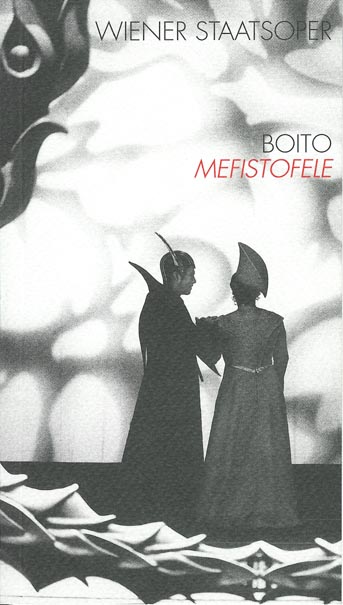
Dienstag, 24. Juni 1997 STAATSOPER
6. Aufführung in dieser Inszenierung
Mefistofele
Oper in einem Prolog,
vier Akten und
einem Epilog
Text und Musik Arrigo Boito
Szenische Einrichtung nach der
Regie und Ausstattung vonPier'Alli
Koproduktion mit dem Teotro alla Scala, Milano
Musikalische Leitung Michael Halász
SpielleitungLorenza Cantini
Diana Kienast
ChoreographieAntonella Agati
ChoreinstudierungDietrich D. Gerpheide
Mefistofele Egils Silins*
Margherita/Elena Michele Crider*
Himmlische Heerscharen -Chorus Mysticus -Cherubim Büßerinnen -landmänner -Bürger -Hexen Nymphen -Sirenen -Koryphäen -Krieger
Knabenchor Bratislava
Leitung Magdalena Rovnáková
Bühnenorchester
der Österreichischen Bundestheater
*Rollendebüt an der
Wiener Stoatsoper
New Opera for me. But the composer was a known name Arrigo Boito, one of Verdi's librettists. The story is from Goethe's Faust, in the world of opera most known as Gounod's FAUST.
But Boito is making another story more complex taking more from the novel by Goethe. It has a prologue and a epilogue. And so it is more confusing, but has some glorious music.
OD Travel
Posted by
operaduets
at
Saturday, June 24, 2017
0
comments
![]()
Labels: 06_June, 1997, ARRIGO BOITO, Austria, Egils Silins, Keith Ikaia-Purdy, MEFISTOFELE, Michele Crider, Opera, Vienna
Friday, June 23, 2017
June 23, 2005: Aida in Verona
2005-06-23 Aida (Verdi), Arena di Verona
The King = Marco Spotti
Amneris = Tichina Vaughn
Aida = Micaela Carosi
Radamès = José Cura
Ramfis = Carlo Colombara
Amonasro = Alberto Mastromarino
A messenger = Carlo Bosi
High Priestess = Antonella Trevisan
Daniel Oren, conductor
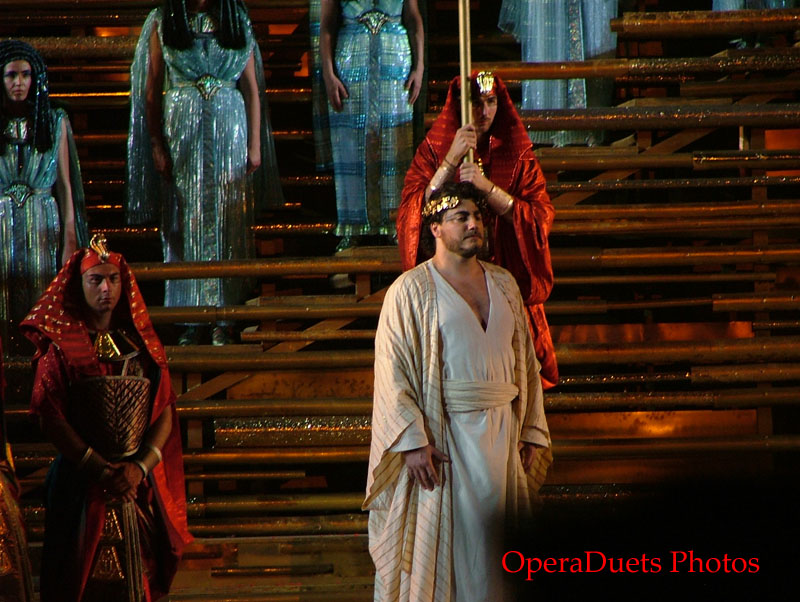
Arena
23 June 2005 - 21.15
Aida
Opera in 4 acts by Giuseppe Verdi
Libretto by Antonio Ghislanzoni
PRINCIPAL CONDUCTOR Daniel Oren
DIRECTOR Franco Zeffirelli
SCENOGRAPHER Franco Zeffirelli
COSTUME DESIGNER Anna Anni
I arrived in Verona Porta Nuova at 1500. It was a hot day. After staying in my hotel Tryp Verona for a few hours I took the Opera Bus to Verona (1830). I tried to find if I could see any JCx friends there, and then I sat at Cafe Opera and had some dinner before the opera. It seem to take forever until day at last opened door one, some trouble with the keys I think.
But at last at the Arena I met Yvonne and Kira and many more. This was a big Zeffirelli Aida production, beautiful and wonderfully operatic. I think I must have had some troubles with my ears because I didn't hear so well the first act. The conductor was a disappointment he was too fast in many of the delicate moments almost ruining the opera. Jose Cura looked wonderful and sing/acted Radames wonderfully. Tichina Vaughn did her best but lacked some of the charisma this role needs. Micaela Carosi had no such troubles, her voice was clear and she had a lot of charisma. No wonder the opera is called AIDA. Alberto Mastromarino was an efficient Amonasro, Carlo Colombara did well as Ramfis, Marco Spotti was OK as the King.
The Ballet was not to my liking, I found it almost offensive. The prima ballerina as a kind of high priestess was a good idea that worked very well.
OD Travel + Photos
Posted by
operaduets
at
Friday, June 23, 2017
0
comments
![]()
Labels: 06_June, 2005, AIDA, Carlo Colombara, GIUSEPPE VERDI, Italy, José Cura, Micaela Carosi, Opera, Tichina Vaughn, Verona


